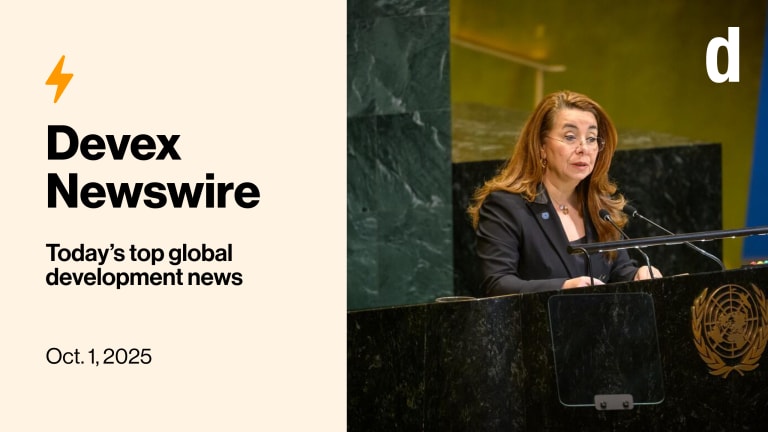SIGAR chief to US contractors: Share information (before it's too late)

While the window for direct oversight of U.S. aid spending in Afghanistan is quickly closing, the very vocal and polarizing reconstruction watchdog chief is enlisting U.S. contractors and NGOs to take part in his push to learn best practices to inform future U.S.-led reconstruction efforts abroad.
John Sopko, the firebrand Special Inspector General for Afghan Reconstruction, told U.S. aid contractors that his office expects no more than 20 percent of Afghanistan’s territory will be accessible to U.S. oversight personnel by the end of the transition period in 2014 — half of what it reached just four years ago.
That lack of accessibility will fundamentally change the way program oversight is conducted in the country, with much greater importance placed on the role of remote and third party monitoring to ensure projects are being implemented according to their agreed upon designs and budgets.
“SIGAR is motivated by a sense of urgency to do as much as possible in as little time as we may have,” Sopko said at a Professional Services Council event on Tuesday.
The SIGAR chief, appointed in 2012 by U.S. President Barack Obama, provided a glimpse of how U.S. agencies and implementing partners will have to adjust to the reality of less direct oversight.
“Remote monitoring is the future,” Sopko said.
The watchdog leader implored industry representatives to help his office collect “best practices” that can guide the remaining reconstruction work in Afghanistan, and provide valuable lessons for next time the U.S. government funds a post-conflict national reconstruction effort abroad.
Polarizing figure
Sopko has been lauded by some and derided by others for his vocal criticisms of foreign aid spending and oversight in Afghanistan and the frequent and attention-grabbing social media messages his office broadcasts to an American public already widely skeptical of the U.S.-led reconstruction effort.
With regard to his office’s uncommon press outreach and Twitter messaging, the SIGAR chief was unapologetic:
“No matter how good an [inspector general] report, no matter how good a Congressional hearing, no matter how good a [Government Accountability Office] report or a commission finding may be, if it falls into the black hole of the Washington background noise, it goes unnoticed,” Sopko said.
Still, some U.S. aid officials and partners question whether they watchdog’s tactics truly contribute to a more robust reconstruction effort or instead provide foreign assistance skeptics fuel to press for budget cuts and greater Congressional control over U.S. aid programs. Others have raised doubts over whether SIGAR’s field auditors have the international development know-how to sufficiently understand the context surrounding the projects they frequently audit and criticize.
Sopko responded directly to a question from Devex about whether criticisms of SIGAR auditors’ inexperience with international development programs are well-founded.
READ MORE:War of words on US aid to Afghanistan
“I don’t think that’s valid at all. A contract is a contract, whether it’s in Afghanistan or Trenton, New Jersey,” Sopko answered. “I think a lot of times that’s used … as an excuse.”
USAID’s role
The SIGAR chief is currently pressing the NGO and contracting communities to share “lessons learned” from the current reconstruction effort, to begin to comment more broadly on the post-war reconstruction and to inform future military and civilian nation-building efforts.
“Those are some of the lessons learned reports we’re going to issue,” he later told Devex. “When I came on we had such a limited number of reports or studies being done… We didn’t have a body of information to learn any lessons from. I think we’re coming to a stage now, because we’re producing 20 to 30 products per quarter … I think we can start asking those questions.”
Sopko however stopped short of drawing any broad-scale conclusions in response to a question from Devex about whether he feels the U.S. Agency for International Development’s role in the Afghanistan reconstruction effort was an appropriate one, given the agency’s capacity, capability, and experience at the time the reconstruction effort began.
“I can’t make that determination … We’re not there yet,” he said.
Still, Sopko thought back to an earlier era when more of USAID’s expertise was contained internally, and less of the agency’s work was contracted to consulting firms and NGOs.
“I remember USAID in the glory days of USAID. They have actually been cut to the bone in a lot of areas,” he said. “[But] it’s not my job to make a comment on why Congress did or didn’t fund.”
The agency, the Afghan government and the watchdog organizations who oversee U.S. spending agree that 2014 is a pivotal year for the reconstruction effort in Afghanistan. SIGAR’s venture into broad lessons learned and best practices for future engagements represents a unique interpretation of the inspector generals’ role in guiding and reporting foreign aid spending.
Read more on U.S. aid reform online, and subscribe to The Development Newswire to receive top international development headlines from the world’s leading donors, news sources and opinion leaders — emailed to you FREE every business day.
See more:
Search for articles
Most Read
- 1
- 2
- 3
- 4
- 5






